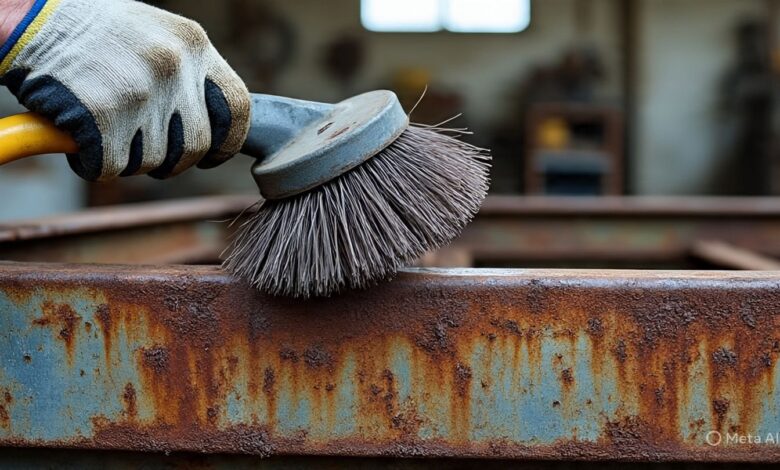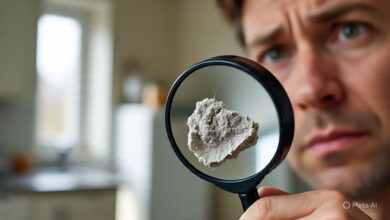How To Remove Rust From Metal

How To Remove Rust From Metal
When I first restored old fixtures in my workshop, I learned that even treated steel can show staining if moisture sneaks under a coat of paint or if water pools where the metal isn’t rust-treated; once a piece is corroded through oxidation and corrosion, the best move is to prevent further damage, especially on mixed metals, because one metal stain can make fresh rust look worse than it is.
What Is Rust And What Causes It?
Rust blooms when humidity and the properties of a given alloy meet condensation, electron reduction, and oxygen; it’s a classic surface corrosion story that keeps increasing on aluminum, copper, stainless, and brass as reactions with moisture attack surfaces, leaving them oxidized, sometimes layered oxidized, even an oxidized (air) film, depending on temperature and the pace of oxidation on iron or noble metals like gold and platinum; in short, metal formation fails when air and wet cycles persist.
How Can You Prevent Rust?
In my experience, you prevent rust by focusing on prevention basics: keep items shaded in humid seasons; follow steps grounded in the principle that it’s better to cure early with good practices, stopping corrosion from occurring, that’s rust-control and oxidation management 101—by managing rain exposure inside and outdoor areas you can clean, limiting corrosion under any coating or protective film on steel; watch for cracks and scratches where moisture creeps deeper, then remove every hidden scratch so joints stay crack-free, keeping metal isolated from oxygen and water.
Keep it dry
Keep parts dry in shaded outdoor alcoves or inside away from rain and humid air to prevent oxidation, because rust on metal accelerates when damp.
Keep it clean
Stay clean, preventing under-film corrosion and fresh rust by washing and drying after use.
Protective coating
A protective coating helps prevent oxygen from reaching bare steel, and sheds water; reapply the coating whenever wear exposes metal.
Avoid cracks or scratches
Seal cracks and buff scratches on steel so moisture can’t seep deeper inside the metal; corrosion becomes harder to remove later, so keep joints crack-free.
Homemade Remedies For Removing Rust?
For budget jobs I mix a paste, nice and thick, with water, baking soda, then apply it to rusty parts; agitate with steel wool and a brush to scour spots, rinse, and dry; a citric acid bath will remove coatings and paint when hot, so measure tablespoons into a container, submerge, and scrub; vinegar overnight soak helps on stubborn patches—go longer, wash with dish soap; for chrome, aluminum foil dip works—gently scrub, the soda’s carbonic bite can break oxide, finish polishing with a soft cloth; the lemon/lime/salt combo adds acidity plus abrasive zest from the rind to lift rust completely; strong chemical removers with phosphoric acid can be corrosive, cause irritation to eyes, so mask up; finally, sandpaper grit and careful sanding level pitting.
Baking Soda
Make a paste, keep it thick with water, add baking soda, then apply to rusty parts; work with steel wool and a brush to scour spots, rinse, and dry.
Citric Acid
A citric acid bath can result in quick oxide lift: it will remove old coatings and paint when hot water and measured tablespoons in a container submerge the piece; scrub, rinse, dry.
White Vinegar
Use vinegar for an overnight soak; on steel, wool plus a brush will scour stubborn rust, go longer, then scrub, wash with soap and water.
Aluminum Foil
Crumple aluminum foil into a ball, dip, then gently scrub rusty spots; a little soda adds carbonic acid to break oxides on metal, remove, finish polishing with a cloth.
Lemon/ Lime and Salt
Blend lemon, lime, and salt: the acidity plus abrasive power across the area you squeeze; let it sit for hours before scrubbing with the rind to clean completely.
Chemical Solutions
Hardware removers on the market can treat metal: a mild polish for the surface, or phosphoric acid gels that dissolve oxides; they’re corrosive chemical options with irritation risk to skin and eyes, so be careful.
Sandpaper
Use sandpaper with the right grit range to remove damaged surface layers; controlled sanding, higher or lesser grades—balances abrasive bite and final polish.
Potato and Baking Soda/ Salt
Leverage oxalic acid in potatoes for cleaning: it can dissolve rust as a diy removal trick, cut, scrub, add baking soda and salt, then rinse.
Products For Removing Rust
When time matters, a liquid remover that’s powerful, quick-acting, and neutral to skin helps on screws or parts you’ve heated; some chemical blends use phosphoric, others lean on oxalic acid; wear gloves, protect delicate surfaces and appliances from damage; a rust converter reacts and prevents new layers forming; choose spray paint with primer coats for tools and parts; powder cleansers with oxalic tackle stain as a paste or spray/foam setting for wider coverage; citric powder from a box in a plastic container with hot water, dip overnight, rinse the metal tool or part, remove rust, cover with a protective mixture in the morning for a concentrated finish.
Engineer Rust Remover ZC-28
This liquid-type rust remover is powerful, quick-acting, and neutral to skin; for screws or tight threads, a heated metal bath improves performance, work gently, keep it heated only as recommended, and avoid prolonged contact.
Chemical Remover
A chemical option, commercial removers that dissolve rust with phosphoric or oxalic acid—requires concentration checks; some are harmful to skin, so take precautions with gloves and treat delicate areas sparingly.
Rust Converters
Use a converter that reacts with rust and prevents further forming; a spray paint primer pairs well under coats on tools and parts, a smart choice if you plan to finish later.
Powder Cleansers
Classic powder cleansers like bar keepers friend are gentle on many surfaces yet tough on rusted grime; sprinkled on wet metal, oxalic acid in the cleanser helps break a stain; add water for a paste, or use spray/foam.
Citric Acid Powders
Citric acid powders, think lemons in a jar—make a concentrated solution: open the box, mix powder in a plastic container with hot water, cover, dip parts overnight, then rinse.
JOB DONE!
With the right plan, rust removal becomes a method you can repeat quickly on any metal surface.
Faqs
What removes rust from metal instantly?
A thick gel spray used with a rotary tool and controlled abrasive attachments on a fiber wheel works quickly—within seconds or minutes, while vinegar soaks or baking paste are effective but require time to remove rust from metal a bit faster than passive methods.
Will WD-40 remove rust on metal?
wd-40 can remove light surface rust by penetrating and loosening bonds; then scrub with an abrasive pad, steel wool, or a brush, and protect afterward.
Will vinegar remove rust from metal?
Yes—vinegar can effectively remove rust from metal because acetic acid reacts with iron oxide into a soluble salt.
How do you get rid of rust in 5 minutes?
For flash rusting, a quick wipe is easy: clean, then resoak in mild acid for a few mins, or use wire brush with brass, steel, and wool pads.
Does baking soda remove rust?
baking soda can remove rust: its mild abrasive and alkaline properties lift light to moderate surface stains; make a paste, apply, scrub, then rinse.
Can Coca-Cola remove rust?
coca-cola can remove rust because of phosphoric acid, an ingredient in commercial removers, if you soak the surface long enough.



a1ni5z
Hmm it appears like your blog ate my first comment (it was super long) so I guess I’ll just sum it up what I had written and say, I’m thoroughly enjoying your blog. I as well am an aspiring blog blogger but I’m still new to the whole thing. Do you have any helpful hints for novice blog writers? I’d genuinely appreciate it.
Hi there just wanted to give you a quick heads up and let you know a few of the images aren’t loading properly. I’m not sure why but I think its a linking issue. I’ve tried it in two different internet browsers and both show the same outcome.
w14r8t